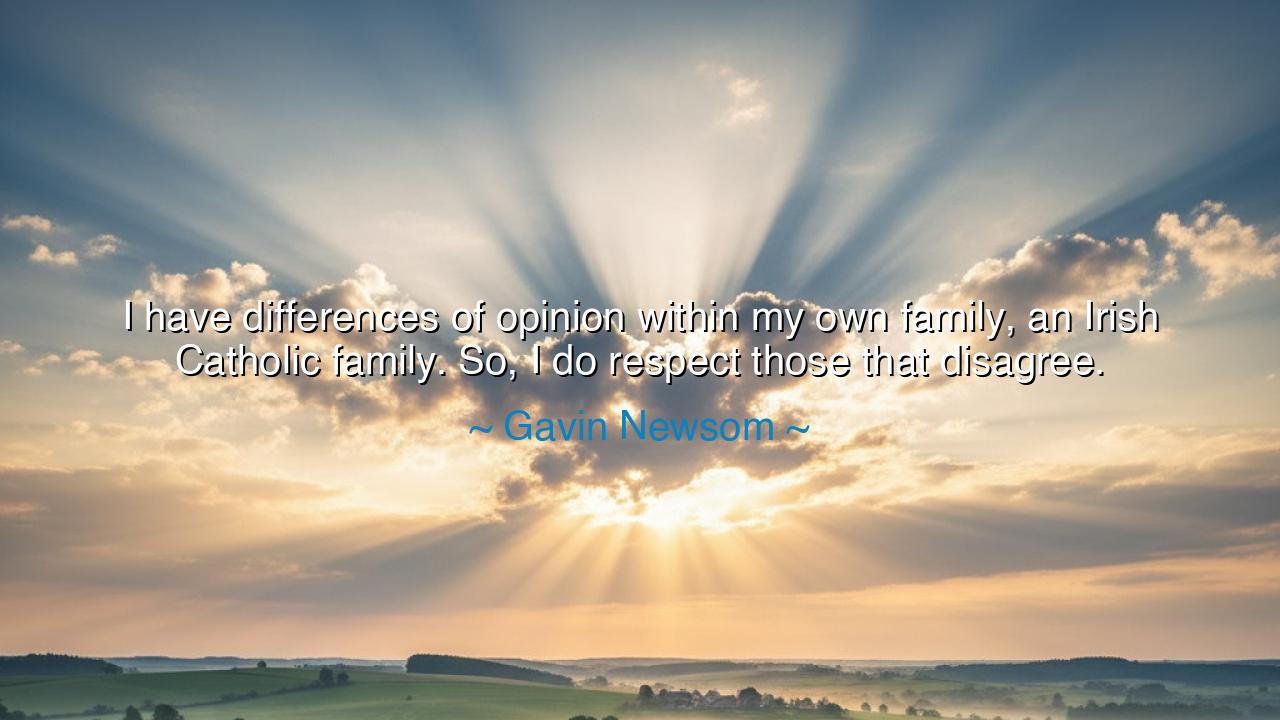
I have differences of opinion within my own family, an Irish
I have differences of opinion within my own family, an Irish Catholic family. So, I do respect those that disagree.






The words of Gavin Newsom—“I have differences of opinion within my own family, an Irish Catholic family. So, I do respect those that disagree.”—rise like a gentle reminder of the eternal truth: that disagreement is not the end of love, but a test of its endurance. He speaks of family, the place where bonds are strongest, and yet where conflicts often burn the fiercest. And in this hearth of difference, he discovers a lesson for the whole of society—that to respect those that disagree is not a weakness, but a virtue, a discipline, a shield against division.
The deeper meaning of his words lies in the union of respect and disagreement. For too often, men believe that respect must vanish when differences appear. Yet this is not so. True respect is proven not in times of agreement, but in times of conflict. When all see alike, harmony is easy; when minds diverge, harmony requires humility, patience, and the recognition that another soul, though walking a different path, is still worthy of honor. Newsom, by looking first to his own household, shows that this lesson begins in the smallest circle and extends outward to nations and worlds.
The ancients knew this well. The Stoic philosophers taught that even those who opposed us, even those who spoke against us, were still brothers under the same stars, born of the same divine order. In the councils of Athens and Rome, fierce debates raged, but when respect held, republics endured. When respect failed, and difference became enmity, collapse was not far behind. Thus, respect for disagreement is not only moral—it is political, the lifeblood of communities and nations.
History gives us luminous examples. Consider Abraham Lincoln, who built his cabinet not only from allies but from rivals. Men who had once opposed him with fiery words he welcomed to his table, respecting their talents and their differences. By doing so, he strengthened the Union in its darkest hour. His respect did not erase conflict, but it transformed it into a force for wisdom and balance. Here, as in Newsom’s reflection, we see that disagreement does not destroy unity when respect holds it together.
There is also a personal, emotional weight in Newsom’s words. To speak of family is to remind us that respect for disagreement is not abstract, but intimate. Who among us has not quarreled with kin, argued at the table, or bristled at a sibling’s stubbornness? Yet in family, bonds endure because respect whispers louder than pride. If such respect can survive there, where emotions run deep, then surely it can be practiced in the wider world, where strangers and citizens alike must coexist.
The lesson for us is plain: do not despise those who disagree with you, but honor them as partners in the greater work of truth. Practically, this means listening before judging, speaking with civility even when passion rises, and refusing to let difference harden into contempt. It means seeing opponents not as enemies, but as fellow seekers of wisdom who travel a different road. Respect, then, becomes not surrender, but the noblest weapon against hatred.
Thus, Gavin Newsom’s words endure as a teaching for all generations: respect is the bridge across the river of difference. Without it, families fracture, nations crumble, and communities fall into bitterness. With it, bonds endure, diversity becomes strength, and truth is approached, if never fully grasped. Let this be the wisdom we pass down: that the measure of our greatness is not how we treat those who agree with us, but how we honor those who do not.






AAdministratorAdministrator
Welcome, honored guests. Please leave a comment, we will respond soon